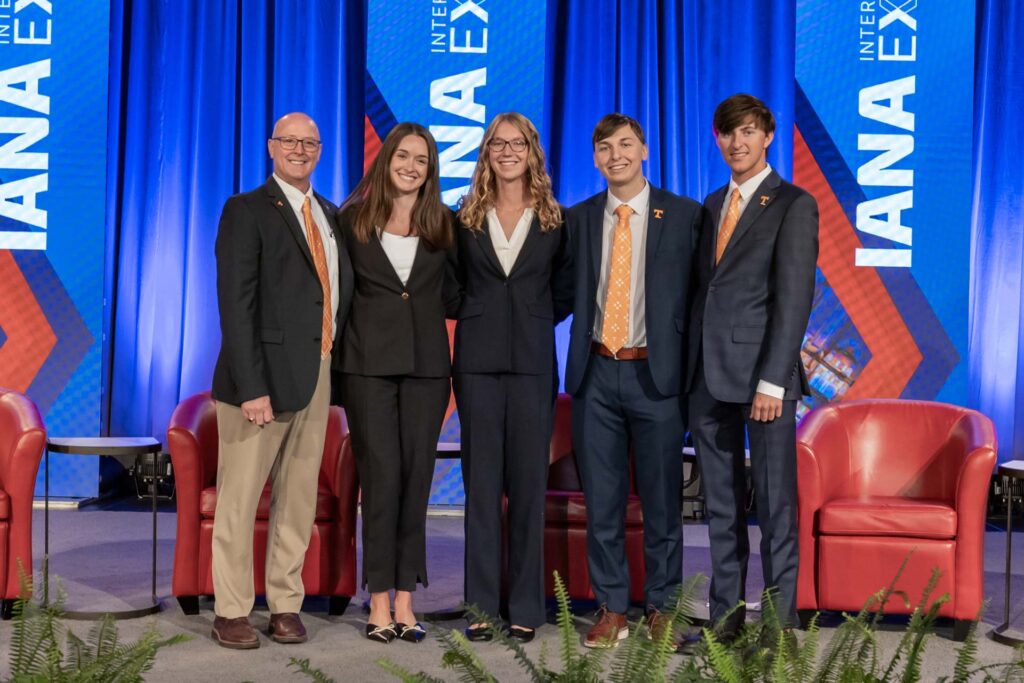The supply chain management team from the University of Tennessee, Knoxville, Haslam College of Business recently won the Intermodal Association of North America (IANA) 2024 Intermodal Case Study Competition in Long Beach, California. In the students’ first time competing together, the team overcame a strong field of contenders to gain the victory. The other competitors included the California State Maritime Academy, College of Charleston, Georgia Southern University, SUNY Maritime and the universities of Arkansas, Maryland, North Florida, North Texas and Wisconsin at Superior.
UT’s team included Jaren Bussell, a senior from Middlesboro, Tennessee, Elizabeth “Lizzie” Shuler, a senior from Knoxville, Brock Sooley, a junior from Antioch, Illinois, and Kathryn Whittaker, a senior from Ashland, Virgina. Don Maier, associate professor of practice in Haslam’s Department of Supply Chain Management (SCM), helped the team prepare before the competition. He called the group’s initiative and preparation leading up to the competition exemplary.
“I couldn’t have asked for a better group of students to take on this trip,” Maier said.
‘Drinking From the Firehose’ Education
Maier and SCM colleagues selected the team in late May. However, the IANA business case problem would not be revealed until just hours before the students had to make their presentation in early September. That meant much of the competition preparation took place over the summer, as Maier sent massive amounts of general supply chain information and old competition cases. Maier describes the approach as “a fast-forward education, drinking from the fire hose, basically.”
When the the students returned to campus in late August, only weeks before the competition, Maier had the team practice delivering presentations while providing them tips about presentation style.
“Watch your time, watch this word, watch that, watch your hand gestures, speak with confidence, word choice — simple things, right?” Maier explained.
In Long Beach, up until the case was released, the team could still prepare with him. Once the students received the case, however, Maier could have no contact with them.
“I got to be the hockey parent, taking the kids to hockey practice by driving the van,” Maier said. “When the competition started, I went off and left the rest to fate.”
Making Their Case
The student teams dealt with a case focused on the “Coronado Cartage Company,” a hypothetical short-distance hauler, based on an actual company. Each team had five hours to read and analyze the case, develop a solution, prepare and submit the presentation. After those five hours were up, no changes could be made to the presentation. Whittaker shared that, from their preparation with Maier, the team knew whose strengths were best suited to which tasks, so they were able to quickly divvy up the case duties.
“We finished creating the presentation with about three minutes to spare, uploaded it to the jump drive and turned it in,” Whittaker said. “It was a lot more fast-paced than we had anticipated, but we stayed focused and determined the whole five hours.”
The next morning, the teams presented to the judges their recommendations for how the company could attract new drivers to the industry and whether to choose either an owner-operator or company-driver business model. When it was the Haslam team’s time to present, like a nervous hockey parent watching the game from the stands, Maier felt visceral reactions to the team’s performance.
“When our team got up there, every time they would trip over their tongue or just not present it exactly right, I felt like I was a boxer getting punched,” he recalled.
Winning the Q&A
Maier’s apprehensions proved unfounded, and his firehose preparation paid off. The Haslam team was among the final three teams selected to move to the next round — a Q&A session with the judges, which would determine the winner. It was Maier’s first time helping a student team, and he admitted to being thrilled just to be in the final three.
“It felt really gratifying for me that our team made it to the top three, and I’m like, ‘Hey, you know what? You guys did great. I’m really proud of you,’” he said.
The Haslam team went first in the Q&A sessions. As he watched the two teams that followed, Maier sensed that his team could very well win. He believes the Haslam team distinguished itself during the Q&A session by not doing what its competitors did: Rehashing their presentation.
“When it came to the Q&A, it was nice and natural, very sincere, professional and good information that they provided,” he said. “Rather than repeating everything they just had in the presentation, they were explaining more about the strategic growth they think could happen if their model was chosen.”
Maier’s prescience proved correct: Haslam was announced as the winner. Shuler recalled the team being overjoyed at winning the competition.
“This was our first time attending the IANA case competition, so we did not know what to expect,” Shuler said. “Even though we had a short time to prepare, we came together very quickly as a team to strategize a unique solution to solve the problem presented. It was an experience I will never forget!”
Maier expressed his pride over the team’s accomplishment.
“It was exciting to see what these students achieved in five hours, and we are grateful for the opportunity to bring this year’s IANA trophy back to Rocky Top,” he said.
(Main photo, from L-R: Don Maier,Kathryn Whittaker, Lizzie Shuler, Brock Sooley and Jaren Bussell)
CONTACT:
Scott McNutt, senior business writer/publicist, rmcnutt4@utk.edu
